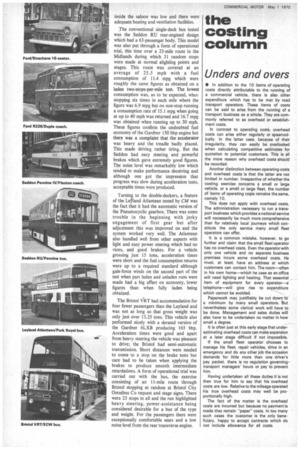the costing column
Page 76

If you've noticed an error in this article please click here to report it so we can fix it.
Unders and overs
• In addition to the 10 items of operating costs directly attributable to the running of a commercial vehicle, there is also other expenditure which has to be met by road transport operators. These items of costs can be said to arise from the running of a transport business as a whole. They are commonly referred to as overhead or establishment costs.
In contrast to operating costs, overhead costs can arise either regularly or spasmodically. In the latter case, because of their irregularity, they can easily be overlooked when calculating competitive estimates for quotation to potential customers. This is all the more reason why overhead costs should be recorded.
Another distinction between operating costs and overhead costs is that the latter are not limited in number. Irrespective of whether the costing exercise concerns a small or large vehicle, or a small or large fleet, the number of items of operating costs remains the same, namely 10.
This does not apply with overhead costs. The administration necessary to run a transport business which provides a national service will necessarily be much more comprehensive than for relatively local journeys which constitute the only service many small fleet operators can offer.
It is a common mistake, however, to go further and claim that the small fleet operator has no overhead costs. Even the operator with only one vehicle and no separate business premises incurs some overhead costs. He must, at least, have an address at which customers can contact him. The room—often in his own home—which he uses as an office will need lighting and heating. That essential item of equipment for every operator--a telephone—will give rise to expenditure which cannot be avoided.
Paperwork may justifiably be cut down to a minimum by many small operators. But nevertheless some clerical work will have to be done. Management and sales duties will also have to be undertaken no matter in how small a degree.
It is often just at this early stage that underestimating overhead costs can make expansion at a later stage difficult if not impossible.
If the small fleet operator chooses to manage his fleet, repair vehicles, drive in an emergency and do any other job the occasion demands for little more than one driver's pay packet, there is no regulation governing • transport managers' hours or pay to prevent him.
Having undertaken all these duties it is not then true for him to say that his overhead costs are low. Relative to the mileage operated his true overhead costs may well be proportionally high.
The fact of the matter is the overhead costs are incurred but because no payment is made they remain "paper" costs. In too many such cases the customer is the only beneficiary, happy to accept contracts which do not include allowance for all costs.
















































































































































































































